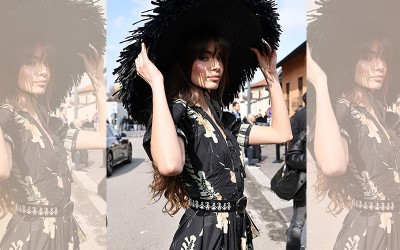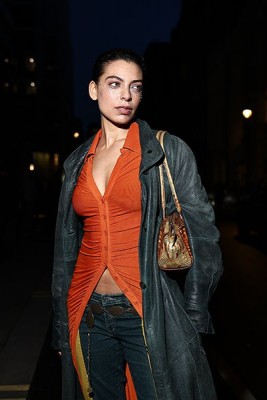
Bourbon inroads in India: A smoky affair
Amid the chaos of an airport in urban India, there it was -- an oasis.
A small kiosk featuring a table topped with bottles of Jim Beam bourbon and throwaway shot glasses provided a quick, responsible fix for nervous flyers and stressed-out business people as they toted suitcases through stifling heat in Bangalore’s international airport last year.
That kiosk, and others like it in Mumbai and Delhi airports, are part of a marketing ploy by Jim Beam, the producer of more than half of the world’s bourbon, to expand its reach into India. The company and its competitors want this distinctly American spirit to go global.
“We believe that we have a good idea of the Jim Beam consumer in India,” said Neeraj Kumar, the marketing director for Beam Suntory India. “They live in the metro cities and are travel-savvy. They have travelled to the U.S. and other international destinations and are familiar with American brands.”
As bourbon whiskey goes through a renaissance of sorts in its home in the U.S. state of Kentucky, its popularity is growing overseas, too. With India being the top consumer of whiskey in the world, the country is a prime target. Exports of bourbon from Kentucky to India more than tripled from 2010 to 2011, peaking in 2013 at more than $350,000 in sales.
Beam, for its part, employs 150 people in India in jobs such as marketing, sales, innovation and local production. Late last year, the company started a bottling operation in India, which brought down the price of its products within the country.
Brewing fears about a bourbon shortage in the Bluegrass State (Kentucky) haven’t stopped many companies from shipping to a country where the growing population has developed a penchant for Western culture. Quite the contrary.
Why India?
Kristin Meadors, director of governmental and regulatory affairs at the Kentucky Distillers Association, said India is the perfect place to expand because of one demographic reality – an “expanding middle class with disposable incomes” to spend on luxury and leisure.
In 2013, exports of whiskey from Kentucky to India reached $353,136, up from $199,233 four years earlier. That peak year of 2013 shot India to 35th in countries to which Kentucky exported whiskey. Last year, exports from Kentucky to India dipped slightly, to $305,162.
Jim Beam officials consider India, the world’s second most-populous nation at more than 1.2 billion people, a huge potential growth market for Kentucky’s most prized whiskey: bourbon. Although India is not the world leader in per-capita consumption of bourbon and other whiskies, its sheer population and increased interest in the spirit push India to number one in the world for total whiskey consumption. According to Business Insider, Indians consumed 1.4 billion liters of whiskey in 2012 – far more than any other country.
The love for whiskey and bourbon isn’t limited to India; Asia overall has a growing thirst for this type of alcohol. Japanese whiskies have grown in popularity, for example, both in the region and worldwide. The Japanese company Suntory merged with Jim Beam to form Beam Suntory in 2014, which created a behemoth of an alcohol portfolio.
Bourbon, unlike many other alcoholic drinks, provides something that the growing Indian middle class prizes – a taste of Western culture within an increasingly globalized society.
“India is witnessing a fascinating evolution around consumer lifestyle and trends,” Kumar said. “Urban Indian consumers are increasingly taking to western spirits and cocktails. … Close to 40 cities in India have a population exceeding one million, and we consider many of these to be future Jim Beam growth markets.”
Lifestyle
Every Sunday, Kolkata schoolteacher Priyam Mullick likes to relax and rejuvenate herself before launching into her difficult work week. A visit to a pub – featuring exotic lights and a live band – lets her indulge in a glass of bourbon and soothe her nerves.
Drinking whiskey is becoming popular in the sprawling eastern Indian city of Kolkata. The city might not be considered the party hub of the country; that tag rests comfortably with other Indian destinations like Mumbai or Delhi. But party lovers in Kolkata cherish their drinks equally.
Among the most popular brands in Kolkata? Jim Beam. Somnath Das, a bartender at Kolkata’s Plush Bar, said “all cocktail-based brands here are prepared with Jim Beam, and even we prepare certain food items with it.”
A burgeoning bourbon-in-food trend echoes Kentucky’s own.
 According to bourbon historian Mike Veach, of the The Filson Bourbon Academy, the spirit went through a period in the United States when it was considered the “cheap stuff,” and customers weren’t interested. The industry had to revamp bourbon’s image into being something sophisticated and worthy of attention (and consumer dollars). Now, there’s an entire urban bourbon trail in Kentucky’s largest city, Louisville, where people can taste dozens of different kinds of bourbons, alongside specialty dishes that pair certain flavors with certain bourbons.
According to bourbon historian Mike Veach, of the The Filson Bourbon Academy, the spirit went through a period in the United States when it was considered the “cheap stuff,” and customers weren’t interested. The industry had to revamp bourbon’s image into being something sophisticated and worthy of attention (and consumer dollars). Now, there’s an entire urban bourbon trail in Kentucky’s largest city, Louisville, where people can taste dozens of different kinds of bourbons, alongside specialty dishes that pair certain flavors with certain bourbons.
Now, in the state where it was born, bourbon is more than a drink; it’s an experience.
That’s not quite true in India -- yet. But customers are becoming more intrigued, and the framework is being laid in bars across the country, like Plush.
Jim Beam has begun a programme called “Kentucky Chew,” which “enables 30 or so top bars across cities like Kolkata, Gurgaon and Bangalore to introduce and pair Jim Beam with the finest courses on their menus,” said Kumar.
And Supreeta Singh, the associate director for PR and events at The Park, a luxury hotel in Kolkata, said bourbons and whiskeys have become an integral part of nightlife in the city.
“For those who are slow drinkers, whiskey is an ideal choice,” she said. “Earlier, it was thought that only a certain age group enjoys whiskey, but now more people are liking their whiskey.”
It’s a phenomenon that has been mirrored in the United States.
Sitting at the designated bourbon bar (Jockey Silks) at Louisville’s own luxury hotel, The Galt House, Denise Shipley said Americans drink bourbon for many of the same reasons Indians do. She enjoys the flavor (“slightly sweeter” than other spirits), and she likes drinking something that has such a rich American history and aging process. “I’m a bit of a bourbon snob,” she said, detailing some of her favorite brands: Blanton’s, Woodford and Angel’s Envy.
She and her husband, Randy Mellon, traveled to Kentucky from southwest Michigan solely to explore the bourbon trail. Such “bourbon tourism” has given the industry positive momentum, and a springboard to break into the global industry.
Interest in bourbon in both cultures even goes further than a mutual appreciation for the spirit’s complex flavors and ability to be paired with fine foods. It points to a common desire for global flavors.
“Americans, after all, love to borrow from other cultures, so it can go the other way,” said Susan Reigler, president of the Louisville-based Bourbon Women Association. “I think people are looking for what is really an authentic American experience. Other cultures are looking to understand America, and bourbon is amongst the most sophisticated of exports.”
Looking forward
The future for the global bourbon industry is the same as any worldwide market – somewhat murky, but full of potential.
One complicating factor is bourbon’s aging process. Some kinds of bourbon take decades to age in the wooden barrels that give the spirit its flavor. With skyrocketing demand both in the United States and beyond, it stands to reason that one day, the bourbon produced by some companies could simply run out as their future supplies aged in warehouses.
This is especially a concern for smaller bourbon producers, and could affect the international market. That’s because focusing more on the burgeoning domestic popularity of bourbon, both in Kentucky and within the United States, could prove more practical than expanding an international portfolio.
“Companies are reallocating their bourbon supply in some markets due to the strong demand for bourbon domestically and internationally,” Meadors, of the Kentucky Distillers Association, said. “Each company and brand makes individual marketing decisions based on their supply and demands for the market.”
But for enormous companies like Beam Suntory with large and varied portfolios of bourbon and other spirits, the push into India is in full force.
“Thanks to our distillery capabilities, our strong inventory and our production expertise from more than 200 years of distilling, Jim Beam is continuing to grow across the globe, with strong momentum in markets across the world,” said Rob Mason, Jim Beam’s vice president of global marketing.
Such moves could pay dividends for bourbon, as it did for wine within India. According to Kolkata Wine Society president Subhasis Ganguli, the most popular wine brands in the country have been wines “from the New World with competitive price points.”
With companies like Beam Suntory beginning bottling operations within India – keeping prices lower – the allure of the Western world that bourbon brings to the Indian population could prove lucrative to the Kentucky-based industry and represent the next chapter in the spirit’s story.
“It’s expanding and has been expanding in foreign countries – one thing that kept (bourbon) alive in the 60s, 70s and 80s was overseas sales at military bases,” said Veach, the bourbon historian.
“With the fall of the Iron Curtain, eastern Europe wanted everything ‘America,’ including bourbon. As bourbon’s gotten even more popular recently, and as it starts to get a reputation of being a fine drink, like cognac and scotch, every country wants to get in on it.”
SIDEBAR:
Women love whiskey too
If real life were like the popular American TV show “Sex and the City,” all women would drink Cosmopolitans – fruity, pink cocktails perfect for gossip and then shoe shopping.
But women are evolving, and so are their drinks. Bourbon whiskey is making steady strides in becoming an equal-opportunity spirit – an experience that anyone can enjoy, regardless of gender, without fear of stereotype.
“A third of America’s bourbon drinkers are now women,” said Susan Reigler, president of the Bourbon Women Association, based in Louisville, Kentucky. “The fabulous thing about drinking bourbon is a little goes a long way. Sipping it neat, you can nurse a bourbon for a much longer time than a glass of wine. You’re not chugging it. The stereotype is that it’s some horrible drink of gunslingers from the 19th century, but it’s time to get over that.”
 The Bourbon Women Association is an organization working to get more females interested in bourbon, and to diversify their interests when it comes to alcohol. The BWA now has more than 600 members, according to Reigler, including women in 20 states and four countries.
The Bourbon Women Association is an organization working to get more females interested in bourbon, and to diversify their interests when it comes to alcohol. The BWA now has more than 600 members, according to Reigler, including women in 20 states and four countries.
That interest in bourbon extends across oceans, as well.
With the passage of time, women in the east Indian city of Kolkata, which is also known popularly as the 'City of Joy', has showed an immense change in their preference towards alcohol. Gone are the days when women loved to drink wine. Now, they have moved ahead and even prefer tasting whiskey which was once considered more as a male's drink.
“Earlier, when I had joined this profession, I used to see women preferring to drink more wine,” said SomnathHalder, who works as Manager-F&B with The Sonnet in Kolkata. “They hardly used to select whiskey as their preferred drink. But now, they drink whiskey and it is becoming quite a popular trend in this city.”
There is still work to be done to combat the stereotype of bourbon-drinking by females.
Sitting in Jockey Silks – a bourbon bar in Louisville’s Galt House Hotel – Denise Shipley works on a glass of bourbon (neat) and talks about her love for the spirit. She’s been a bourbon-drinker since she can remember, and she’s had a lot of experience with sidewise glances from other women when she orders bourbon.
“I have friends who will drink a whole bottle of wine, and no one will think anything of it,” Shipley said. “But I order bourbon, and people assume I’m this hardcore drinker.”
Although she said the perception is gradually getting better, it doesn’t change the fact that there are definitely previously-held beliefs about what women and men are “supposed” to drink.
But women choosing to drink bourbon over wine or cocktails can be as simple as why men choose the same drink.
“I think women enjoy really fine culinary experiences,” Reigler said. “If you enjoy fine wine or craft beers, you’re going to also be very attracted to bourbon.”
PHOTO CAPTIONS:
1. A Jim Beam party at The Park, Kolkata
2. Avrajit Nandi (Right in the image), who works as a Bar Tender and Mixologist with Unwine Lounge in Kolkata’s The Sonnet hotel and Somnath Halder (Left in the image), who is working as Manager-F&B with the same hotel, have both tasted the brand and consider its smokiness to be a quality which makes it different from others.
3. Somnath Das, who works as a bar tender in Plush Lounge & Bar in Kolkata, has tasted Jim Beam and considers the brand to be quite unique from others due to its smoky flavour.
4, 5, 6: Jim Beam facilities in Kentucky, USA, its home state in USA.
Support Our Journalism
We cannot do without you.. your contribution supports unbiased journalism
IBNS is not driven by any ism- not wokeism, not racism, not skewed secularism, not hyper right-wing or left liberal ideals, nor by any hardline religious beliefs or hyper nationalism. We want to serve you good old objective news, as they are. We do not judge or preach. We let people decide for themselves. We only try to present factual and well-sourced news.







